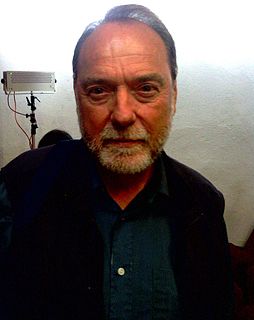A Quote by Ian Tattersall
When environments change, they usually do so pretty rapidly, at rates with which adaptation by natural selection would be hard put to keep up. When such change occurs, the quality of your adaptation to your old habitat is irrelevant, and any competitive advantage you might have had may be eliminated at a stroke.
Related Quotes
Throughout his last half-dozen books, for example, Arthur Koestler has been conducting a campaign against his own misunderstanding of Darwinism. He hopes to find some ordering force, constraining evolution to certain directions and overriding the influence of natural selection. [...] Darwinism is not the theory of capricious change that Koestler imagines. Random variation may be the raw material of change, but natural selection builds good design by rejecting most variants while accepting and accumulating the few that improve adaptation to local environments.
Natural selection is just three factors - over-production, variation, and inheritance combined to produce adaptation to changing local environments. It's not a principle or progress; it's just a principle of local adaptation. You don't make better creatures in any cosmic sense; you make creatures that are better suited to the changing climates of their local habitats.
I think the question is, how do we live with change? Change in our friends, change in our lovers? Change in me and change in my body, from the stroke. Things have changed this plane of consciousness. We've tried to keep things the same. It causes suffering. This suffering is another step in your spiritual life, in your spiritual journey.
Obviously the policies put forward by the IOC and other organizations are evolving and perhaps they may change after I have competed. But I would ask people to keep an open mind and perhaps look to the fact that I didn't win, as evidence that any advantage I may hold is not as great as they may think.
It's good to be aware that a certain amount of fear is going to accompany every change in your life - a change for the worse or a change for the better. Knowing this can stop you from moving into fear about Change Itself. If you start fearing change generically you could wind up shrinking from ever making any kind of change at all for the rest of your day - even a change that obviously should be made for your own good.
I recognize thart even you, yourself, will change. Your ideals will change, your tastes will change, your desires will change. Your whole understandings of who you are had better change, because if it doesn't change, you've become a very static personality over a great many years, and nothing would displease me more. And so I recognize that the process of evolution will produce changes in you.
Darwin's principle of natural selection leads to the prediction that the proper way to analyze any evolutionary development is to see the new features as adaptive to environments. And that's a perfectly good principle. The problem is that there are many evolutionary biologists who view everything that happens in evolution as directly evolved for adaptive benefit. And that just doesn't work. Whenever you build a structure for adaptive reasons, the structure is going to exhibit properties that have nothing to do with adaptation. They're just side consequences.
. . . I wrote a letter to Thomas Pynchon asking, Can I have your permission to try to make an [adaptation] of your book? And I had no idea that he would answer me, because he's pretty elusive. But he did send a letter back that said, Yes, you can do that - as long as the only instrument in the opera is a banjo. I thought, That's an interesting way of saying No.
I do remain optimistic that one day the world will realise that carbon dioxide is more of a friend than an enemy to the earth's flora and fauna, and I do seriously believe that, given the extraordinary complexity of the natural forces controlling our climate, which have done so for millions of years, the only sensible policy response to the natural process of climate change is prudent and cost-effective adaptation.



























